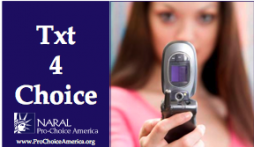Curious how your state ranks on reproductive choice? NARAL Pro-Choice America makes it easy to find out. By texting the word "grade" and the abbreviation of your state to a short code, you get an almost-instantaneous text response with your state's grade and opportunities for more information. "One of the reasons we decided to invest in mobile technology is we want to diversify how we're communicating with people," said Kristin Koch, Deputy Director of Communications at NARAL. NARAL recently began a mobile program -- they're calling it Txt4Choice -- and has been exploring how to use mobile in ways that compliment and integrate into their already developed communications strategy.
NARAL has used its mobile network in several different ways, said Koch and Communications Director Ted Miller. In addition to the text message infoline, which provides information both about the grades of different states and Obama's and McCain's positions on reproductive rights, NARAL has built a mobile list of about 1200 people, and regularly sends out text messages with breaking news or requests to contact a member of Congress to lobby for legislation. Koch said that NARAL has tried to contact the mobile list only when appropriate. "We're trying to use it sparingly, and to use it for late-breaking news," she said. "We use mobile especially on something that may not warrant an email message, when we only have a few hours to get involved, or when an email might be too slow.
For example, one text message sent to the NARAL list read, "NARAL: Tell your senators to oppose extreme anti-choice judicial nominee Richard Honaker. Reply CALL or dial 202-684-8507. Replystop2optout." Another message asks that subscribers try out NARAL's infoline. "NARAL: Get facts about McCain's extreme record at your fingertips! Reply 'Issue + Birth Control, SexEd, Clinics OR Abortion' today! ReplyStop2OptOut." Miller said that one of the challenges that NARAL has faced is crafting messages that fit into the 160 character limit of an SMS. "You have to take information and find out how it boils down into a screen the size of a cell phone," he said. "We deal with complex issues, so we've become creative and innovative in ways that we didn't before." Some messages allow users to call in to listen to a recorded message with more information.
One of the factors that has lead to Txt2Choice's success is its integration with the rest of NARAL's existing communications strategy. "We let people decide how they want us to communicate with them," said Miller. "People need to be able to decide how they receive information." Announcements about the texting program are often included in emails, newsletters and on social networking pages, and NARAL has printed business card-sized ads with information about how to opt-in and out of the text program. "The topics we're talking about are totally near the rest of our online program," said Koch. NARAL uses Mobile Commons as its vendor.
NARAL's mobile program has faced some challenges. In September of 2007, Verizon refused to provision NARAL with a short code to send text messages on the Verizon network, despite the fact that users specifically opt-in to receive NARAL text messages. Verizon told NARAL that the carrier “does not accept issue-oriented (abortion, war, etc.) programs — only basic, general politician-related campaigns (Mitt Romney, Hillary Clinton, etc.).” However, Verizon reversed its decision one day later, after general uproar from the media and advocacy groups. Koch said that the conflict actually helped NARAL, bringing more attention to their mobile list. "After our short code was rejected we saw a jump in subscribers," said Koch. "People were pretty outraged, and I think it was a good reminder of why we have to fight for some of this."
Another challenge has been getting constituents to see mobile as an interactive medium, unlike email. "Not a lot of people interact with advocacy yet, so they don't know what that means," Koch said. She said that one of the challenges to recruiting a mobile list is that people don't know what to expect with mobile, both in terms of content and how and when they'll be contacted. "They know what they're going to get emails about, but they don't have a picture of mobile communication in their head," she said. Koch would also like to see mobile vendors improve the data that they receive from mobile campaigns.
Koch and Miller said that they definitely see mobile being an important component of NARAL's communications strategy in the future. They plan on expanding their infoline and including more state-specific information. They also intend to integrate mobile into their election advocacy work. Koch also sees possibilities for doing a text-to-screen campaign -- when people send an SMS to a short code their text message would show up on a jumbotron or large screen. "We want to keep thinking of more creative ways to interact with people that mobile gives us that other technologies don't," said Koch. Miller said that he sees mobile phones becoming increasingly prevalent in advocacy in the future. "It seems that the cell phone is going to be the new computer, so we want to be ahead of that curve."


Post new comment